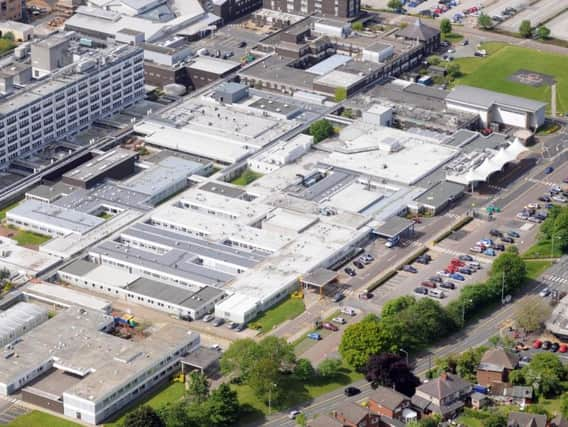Lancashire NHS chiefs trying to plug £37m black hole in finances


Bosses at Lancashire Teaching Hospitals NHS Foundation Trust ended the financial year in April £37m in the red - one of the largest losses in the country and the fourth worse in the North of England.
The trust, which runs the Royal Preston and Chorley and South Ribble District General Hospitals, was anticipated to post a deficit of £7,766,000 for the 2017/18 financial year.
Advertisement
Hide AdAdvertisement
Hide AdBut instead, a report from NHS Improve released yesterday shows it was £37,590,000 in the red - one of the worst financial performances in the whole of the North.
Only trusts in North Cumbria, Northern Lincolnshire and Morecambe had larger deficits.
The trust has cited pressure from high volumes of patients admitted into the urgent care service resulting in more spending on overtime and agency staff as a contributing factor. They say this also increases waiting times.
Yesterday, Chorley’s MP offered to personally broker a meeting between Lancashire NHS bosses and the Government’s health secretary to demand crucial funding. Lancashire Teaching Hospital Trust’s perilous financial position mirrors the wider picture across the NHS. The NHS Improvement report shows the NHS provider sector ended the financial year with a deficit of £960million - £464million above the plan set for the year.
Advertisement
Hide AdAdvertisement
Hide AdThe report also highlights that NHS providers in England did not meet targets for diagnostic tests, referral to treatment times and some cancer care targets.
Lancashire Teaching Hospitals Trust fell short of the targets for A&E waiting times and referral treatment times as well as some targets for referrals for cancer patients. Karen Partington, chief executive of Lancashire Teaching Hospitals NHS Foundation Trust said, “For us, operational and financial performance are inextricably linked.
“As we are seeing in hospitals across the country, the number of patients who are admitted for urgent care and treatment is increasing significantly every year.
“When hospitals are full for extended periods, the NHS spends more on overtime and agency staff to ensure safe and effective care can be maintained.
Advertisement
Hide AdAdvertisement
Hide Ad“When wards are constantly full, we don’t have enough capacity to admit everyone scheduled for a planned procedure or operation, which increases waiting times. But however busy we are, we always prioritise care and treatment for those with the most urgent needs, and whose outcomes would be compromised by delays.
“This is in line with guidance published by the National Emergency Pressures Panel, and is considered best practice for hospitals across the country when under pressure.
“This month local health and care organisations met to map and review urgent and emergency care processes and pathways, to identify what’s working, and address what isn’t, so that together we can drive improvements to ensure that in the future our communities can access the care they need, when they need it, in the appropriate setting.
“This will free up our hospitals to provide the specialist care and treatment only hospitals can, which we believe is the key to improving both our financial and operational performance, and more importantly, delivering a better service for our patients.
Advertisement
Hide AdAdvertisement
Hide Ad“Within the hospitals we are also embedding a continuous improvement approach so that we’re constantly reducing waste and eliminating inefficiencies, which will release more time to care, as well as achieve savings.”
As well as extending his hand to help, Sir Lindsay’s offer comes with a warning - for the trust to be “honest and open” about its financial position. He said: “I know that NHS Trusts right across England are operating in difficult times, government spending reductions mixed with costly restructures have cost the NHS since 2010. Our doctors and nurses are being asked to do more for less money.
“Yet, our Trust here in Lancashire has one of the largest deficits across the north, whilst at the same time we know that the Trust has declared nearly 90 critical ‘OPEL’ [operational pressures escalation levels] situations.
“For a long time now I have offered to broker meetings with NHS England and the Health Secretary but Trust management will not be honest about the dire state of the Trust. If they’re honest and open I will personally sit them down in a room with Jeremy Hunt and demand more funding.
Advertisement
Hide AdAdvertisement
Hide Ad“When we work together we can get results – just as we did with the reopening of the A&E unit. The people of Chorley and Preston deserve two fully operational hospitals with A&E Units but the only way forward is honesty and transparency.
“I don’t want to see this hit services any further or be used as an excuse for reduced services at Chorley or Preston. We need to work together to get extra funding that the Health Secretary has promised.”
Lancashire Teaching Hospitals publishes its financial position publicly in monthly board reports.
But Sir Lindsay added: “Despite direct letters and questions about funding, staff morale and other operational issues, the Trust delays answering or doesn’t provide specific information. It got so bad on the A&E campaign that we had to FOI (Freedom of Information) for basic updates.”
Advertisement
Hide AdAdvertisement
Hide AdThe report reveals a high number of vacancies in the NHS provider sector with 92,000 posts empty nationally. In Lancashire the Teaching Hospitals Trust has seen four senior directors announce their resignations following a challenging winter.
One Adlington resident told the Post that despite the bleak outlook his experience as a patient has been second to none.
The 60-year-old man said today: “I was admitted to Chorley and South Ribble Hospital as a day patient only last week and I can’t praise the staff highly enough.
“I am sure they are understaffed and under-funded but the hospital is clean, well-run and the staff are excellent.
‘I have had experiences in many hospitals and trust me Chorley is one of the best. They need more Government help - and soon.”